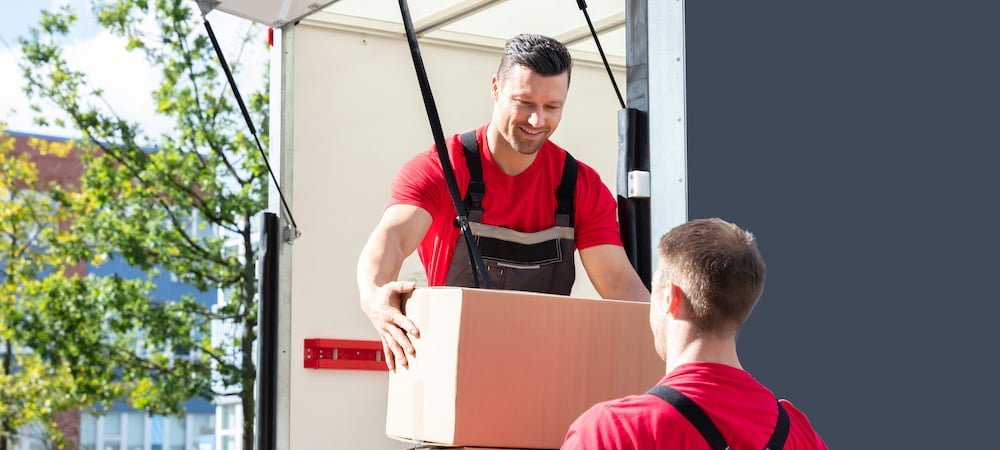Step-by-step walkthrough to hiring the right overseas movers
Wiki Article
Recognizing the Inclusions of moving and Freight Forwarding worldwide of Domestic and Worldwide Shipping
Guiding with the intricacies of moving and Freight forwarding can be challenging. Both processes involve distinct procedures and needs that are critical for effective transport. Recognizing the distinctions in logistics, paperwork, and threat management is important for people and companies alike. This expertise can greatly impact the efficiency and safety and security of shipments. However, several are unaware of the details parts that influence the general experience and outcomes. What aspects should one consider to assure a smooth transition?The Fundamentals of moving and Freight Forwarding
moving and Freight forwarding are essential components of the global logistics sector. They facilitate the transfer of items and personal valuables across domestic and global borders. moving primarily entails the relocation of people or households, incorporating domestic and business demands. It normally consists of packing, filling, transferring, and unboxing items at the location. In contrast, Freight forwarding is concentrated on the delivery of products, commonly wholesale, using different transportation settings, such as sea, land.freight, or air forwarders work as intermediaries, collaborating logistics to ensure timely shipment while maneuvering via complex regulations and personalizeds treatments. Both processes require cautious preparation, company, and interaction to ensure efficiency and lessen disturbances. Understanding these fundamentals is crucial for any individual associated with logistics, as they lay the foundation for advanced facets of shipping and transportation administration.Key Components of Freight Forwarding Services
Freight forwarding services incorporate numerous important components that ensure smooth transportation of items. Trick responsibilities of Freight forwarders consist of taking care of logistics, coordinating deliveries, and taking care of customs clearance. In addition, recognizing crucial shipping paperwork is imperative for conformity and efficient movement of freight.Freight Forwarder Responsibilities
A trusted Freight forwarder plays a vital role in collaborating the transportation of products, making sure that deliveries are taken care of successfully and in compliance with guidelines. Their duties encompass different key tasks, including selecting ideal transport routes, discussing Freight rates, and handling logistics. They serve as middlemans in between providers and shippers, making sure that freight is effectively packaged and identified for secure transportation. In addition, Freight forwarders track shipments, providing updates to clients regarding the standing and expected delivery times. They additionally assess and manage threats related to transportation, recommending insurance policy options as needed. By assisting in communication and documents, Freight forwarders improve the delivery procedure, decreasing potential delays and enhancing total supply chain performance.Delivering Documentation Essentials

Understanding Custom-mades Clearance and Paperwork
Exact paperwork is important in the custom-mades clearance procedure, as it assures conformity with various policies. A summary of personalizeds regulations highlights the complexities dealt with by shippers and Freight forwarders. Usual clearance difficulties can considerably influence delivery timelines and costs, making understanding this facet necessary for efficient logistics.Relevance of Accurate Paperwork
Steering with the complexities of international shipping needs an eager understanding of personalizeds clearance and the critical duty of documentation. Exact documentation is vital for ensuring that shipments adhere to regulations and reach their destinations right away. Correctly prepared files, including costs of lading, industrial invoices, and packing checklists, help with smooth interactions with customizeds authorities. Inaccuracies can cause shipment hold-ups, fines, or also confiscation of goods. Moreover, detailed paperwork aids in monitoring deliveries and resolving conflicts. Companies engaged in moving and Freight forwarding should focus on careful paperwork practices to navigate the detailed landscape of international shipping properly. This diligence not only simplifies procedures however also boosts customer contentment by guaranteeing timely delivery.Customizeds Regulations Review
Guiding personalizeds guidelines is a vital facet of worldwide trade that directly influences the success of moving and Freight forwarding procedures. Effective custom-mades clearance calls for an understanding of numerous laws, consisting of tariffs, obligations, and import/export limitations. Precise documentation is important, as it assures compliance with lawful demands and promotes the efficient activity of products throughout borders. Trick papers usually include industrial billings, packing checklists, and expenses of lading, which offer in-depth info about the shipment. In addition, custom-mades brokers play a crucial role in guiding intricate laws, serving as intermediaries in between carriers and customizeds authorities. By maintaining comprehensive understanding of customizeds processes, companies can greatly decrease hold-ups and lessen expenses related to international shipping.Typical Clearance Challenges
Numerous challenges can develop during the personalizeds clearance process, typically complicating the movement of goods throughout boundaries. One substantial you can look here issue wants paperwork, which can cause delays and charges. Importers and exporters need to ensure all required documentation, such as invoices, packaging lists, and certificates of origin, is total and accurate. In addition, inconsistencies in valuation can trigger examination from customs authorities, causing added tasks or inspections. Language barriers may also posture obstacles, as miscommunication can result in misunderstandings regarding policies. Modifications in customs guidelines can produce complication, necessitating constant alertness by carriers. Ultimately, getting over these clearance challenges calls for extensive preparation and a clear understanding of personalizeds needs to promote smooth worldwide transactions.Product Packaging and Classifying Demands
Although typically ignored, packaging and labeling requirements play a necessary role in the delivery procedure, making sure that products are secured and quickly identifiable throughout their journey. Proper product packaging safeguards things from damages during transportation, while additionally assisting in effective handling and storage. Utilizing proper materials, such as bubble cover, foam, or strong boxes, can avoid damage and loss.Labeling is similarly important. Clear and precise tags convey critical details, including the destination, handling guidelines, and contents. Labels have to abide by guidelines particular to worldwide and residential shipping, which may include dangerous materials recognition or custom-mades declarations.Moreover, standard labeling practices simplify the tracking process and boost total logistics performance. By adhering to packaging and labeling requirements, companies decrease the danger of delays, damage, or misdelivery. Ultimately, these practices contribute significantly to the success of moving and Freight forwarding operations, making sure a seamless delivery experience for all events involvedTracking Shipments: Significance and Methods
Efficient packaging and labeling established the structure for effective shipment administration, yet tracking shipments is similarly essential in the delivery procedure. Shipment monitoring supplies real-time presence, which helps consumers and services keep track of the progression of their items. This openness enhances customer contentment, given that customers can stay notified about shipment timelines and any type of prospective delays.Several approaches promote efficient monitoring. Barcode scanning is a typical approach, making use of unique identifiers to keep track of bundles throughout their trip. In addition, GPS modern technology makes it possible for precise place monitoring, permitting timely updates and enhanced logistics management. Many shipping business currently use electronic systems and mobile applications that supply customers with very easy access to tracking information.The importance of shipment monitoring can not be overemphasized; it lessens the threat of lost or harmed goods, boosts operational effectiveness, and cultivates trust between recipients and carriers. Integrating effective monitoring techniques is important for successful residential and worldwide shipping operations.Insurance Options for Your Goods

Protecting insurance policy for items en route is a vital factor to consider for people and services alike. Insurance policy options vary based on the kind of delivery, worth of products, and particular dangers included. Common types include service provider obligation, which covers loss or damage while in transportation, and full-value insurance coverage, providing substantial coverage for the overall value of the goods.Shippers might additionally take into consideration marine insurance coverage for global shipments, shielding against dangers connected with sea transport. It is vital to examine the particular needs of the shipment and examine the terms and problems of any policy.Furthermore, understanding exemptions and constraints is essential to stay clear of prospective gaps in protection. Carriers should engage with insurance coverage specialists to explore tailored options that fit their unique circumstances. Ultimately, buying the appropriate insurance can minimize monetary dangers and offer satisfaction throughout the delivery process.
Selecting the Right moving and Freight Forwarding Solution
When choosing a relocating and Freight forwarding solution, it is essential for organizations and individuals to very carefully evaluate their certain demands and top priorities. Aspects such as the quantity of items, location, and timeline play a considerable duty in this decision-making process. Researching numerous carriers is recommended; comparing their services, pricing, and client testimonials can expose important insights.Additionally, it is check my source essential to take into consideration the experience and competence of the provider in managing particular kinds of freight, particularly for worldwide shipments that may involve personalizeds clearance. Openness in rates, including any hidden charges, ought to additionally be scrutinized.Furthermore, examining check my blog the level of customer assistance used is vital, as prompt communication can alleviate concerns during transit (freight shipping). Lastly, validating the accessibility of insurance options assures that goods are secured throughout the shipping process. By taking these steps, businesses and individuals can make enlightened selections that align with their logistics demandsFrequently Asked Questions
What Sorts Of Product Can Be Shipped Internationally?

How Do Shipping Expenses Differ Between Different Service Providers?
Delivering prices differ greatly in between providers because of elements such as solution speed, freight kind, range, and additional services provided. Each provider's pricing design reflects these variables, influencing overall delivery expenses for customers.
Can I Ship Hazardous Products or Perishables?
Delivering dangerous materials and perishables is subject to rigorous policies. Service providers commonly call for specific product packaging, labeling, and documentation. Carriers need to assure conformity with regional and worldwide laws to avoid fines and assure safe transportation.What Should I Do if My Shipment Is Postponed?
When confronted with a delivery delay, one ought to first contact the provider for updates. Evaluate any type of notifications got, assess alternate remedies, and maintain all celebrations informed about the circumstance to minimize disturbances.Exist Weight Purview for Delivery Containers?
Weight limitations for delivery containers differ depending on factors like container dimension and shipping guidelines. Usually, standard containers have a maximum gross weight of around 30,000 to 32,000 kilograms to assure risk-free transport and handling. In comparison, Freight forwarding is concentrated on the shipment of items, often in bulk, utilizing various transportation modes, such as air, sea, or land.Freight forwarders act as middlemans, coordinating logistics to assure timely delivery while steering with complicated guidelines and personalizeds treatments. Key duties of Freight forwarders consist of taking care of logistics, working with deliveries, and handling custom-mades clearance. A trustworthy Freight forwarder plays a vital function in collaborating the transport of products, guaranteeing that deliveries are managed successfully and in compliance with regulations. Efficient packaging and labeling established the structure for successful shipment administration, yet tracking shipments is similarly necessary in the shipping procedure. Many delivery companies currently offer digital platforms and mobile applications that supply customers with very easy access to tracking information.The importance of delivery monitoring can not be overstated; it reduces the risk of shed or damaged products, improves functional efficiency, and fosters count on in between receivers and carriers.Report this wiki page